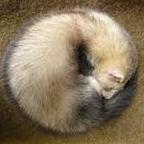-
Content Count
3 -
Joined
-
Last visited
About Oblomov
-
Rank
Norfolk Broads
Profile Information
-
Gender
Male
-
Location
Near Bath, Somerset
Recent Profile Visitors
1,208 profile views
-
 Oblomov changed their profile photo
Oblomov changed their profile photo
-
Yes, I recently came across this on a film forum where a member, responding to someone else who'd made the same point repeatedly, wrote, "Stop banging on about this like an aspie!" The other person replied, quite reasonably, "I do not have Asperger's Syndrome." What really surprised me, though, was that the film forum Moderator - who is (rightly) super-vigilant about insults to other minority groups - did not intervene. There's a parallel here in the way "gay" became an insulting term, as described in this article: http://thetab.com/2016/02/27/its-2016-there-are-still-people-using-gay-as-an-insult-and-they-really-need-to-stop-75926 This is ironic because "gay" was originally adopted as a positive alternative to terms of homophobic abuse like "queer", "poof" and "ponce" which were commonly used when I was at school in the 1970s. Historically, the politicised sectors of minority groups have reclaimed words that were once used against them. Some members of my generation of gay men adopted the word "queer" to describe themselves in preference to "gay" which they felt was too bland. Black American activists - like the radical writer James Baldwin - reclaimed the "N" word in the 1960s. Maybe one day it will be possible for autistic people to follow suit, so that words like "aspie" or "autist" belong to us and not to the neurotypicals who (kindly or otherwise) label us with them. Or we could create/adopt new words to describe ourselves, as gradually happened with "gay" in the middle of the twentieth-century.
-

Best way to deal with tantrums (12 year old girl).
Oblomov replied to joybed's topic in Help and Advice
jojoba04, although I can't advise - I've never been a parent - I'd just like to say that your daughter is very fortunate to have a mother who cares so much about her and is trying to find the right solution. If I project myself back forty-odd years to when I was 12, I can identify with aspects of your description of your daughter's behaviour. I too was "sweet, quiet, polite, painfully shy" (perhaps even more unusual for a boy) but when I got home from school I'd have terrible rages, once slamming a drawer in my bedroom desk so hard it broke. One evening I told my mother I was going to kill myself - and for a moment at least really meant it - but her reaction was merely to become very angry, taking my suicide threat as a personal insult. The trigger incidentally was my spilling ink over a new maths textbook when doing homework - though obviously there were far deeper causes underlying that. These were never investigated by my parents or anyone else. Although I was academically gifted, I was a very slow worker, especially on my own, so homework was a source of great anxiety for me - a mountain to be faced every evening and one which seemed to become bigger as the schoolday wore on with two, three, four subjects being piled on, all to be done at the end of an exhausting day. In the 1970s there was no internet to consult, I was an only child and between the ages 11 and 16 I had no friends whatsoever. (I didn't even live in the same area as those in my class.) In most subjects I was always terrified of misunderstanding the question or getting everything wrong. Asperger's was virtually unknown then, at least in the UK, and there was certainly no help ever offered to me either in terms of socialising or approaches to schoolwork. As far as all the teachers were concerned, I was a very bright boy and the fact I had no friends, solitary interests and was rubbish at sports and practical subjects gave them no cause for concern. I managed generally to conceal any meltdowns from the wider family, but I remember on rare occasions when they did occur aunts or grandparents would be shocked and say, "I've never seen you like this!" But there was no real attempt, as far as I know, to understand what might be wrong with me. I wasn't diagnosed with Asperger's until recently, at the age of 55 (and even then only after years of persistence on my part) and I think my life would have been a lot easier if I'd been offered the specific forms of help I needed much earlier. So if a diagnosis is available for your daughter, and she does prove to have AS, I believe you'd be doing her a great lifelong favour by allowing her to access the support which seems to be provided now - at any rate, it would be more than I ever received! If she doesn't have AS, at least you've ruled it out. -
Hello... Thank you to the Moderators for validating me. Even in the real world, when using my real name, it's so difficult to validate my identity as I've never possessed either a passport or a driving licence. Why would I need them? I hate travelling and never managed even to ride a bicycle! These unusual traits - and many others - have recently been explained by my clinical diagnosis (by the NHS BASS team) at the age of 55 with Asperger's, following ten years of trying to get GPs to take me seriously on this issue. It was no surprise to me, as all my life I've been (painfully or humorously) aware that my "face doesn't fit," as they're fond of saying in workplaces. All my O-levels, A-levels and arts degree counted for nothing when trying for jobs. I think the nadir of my employment search was when I was interviewed in a factory where books were manually wrapped in plastic jackets. "So why does a graduate want this job?" they asked. "Err, because I like handling plastic?" I suggested. I didn't get the job - though a few years later I wrote a book of my own which a distinguished academic publisher added to their catalogue. The Daily Telegraph reviewer included it in a list of the Most Bizarre Books of 1995. Isn't life exhausting? I identify with Oblomov, the central character of Ivan Goncharov's 1859 novel, who can barely make it out of his bedroom - though Oblomov is one up on me as he can sleep round the clock, where as I've had chronic insomnia since the age of forty (another Asperger trait). I do exercise every day, though as soon as I step out the front door, a total stranger is likely to shout at me, "Cheer up mate, it might never 'appen!" (But it already has...) In the novel, Oblomov's best friend is called Stoltz, a typical neurotypical who is always doing things and urging Oblomov to get out and about. In my life too, there's a Stoltz - my partner (latterly civil partner) for 27 years who cannot stop working, mostly unpaid, and seldom spends any waking time at home. He's very much a "get up and go" person where as I'm a "go and lie down" type. Both the fictional Oblomov and I are examples of "the superfluous man" - a Russian literary concept rather than a judgemental term - though personally I'm quite happy to be superfluous in a world whose values are mostly so alien to mine. Please feel free to ask me any questions, especially about my Asperger's or diagnosis. I enjoy writing about myself, as it's the one subject on which I feel I can speak with total authority.


